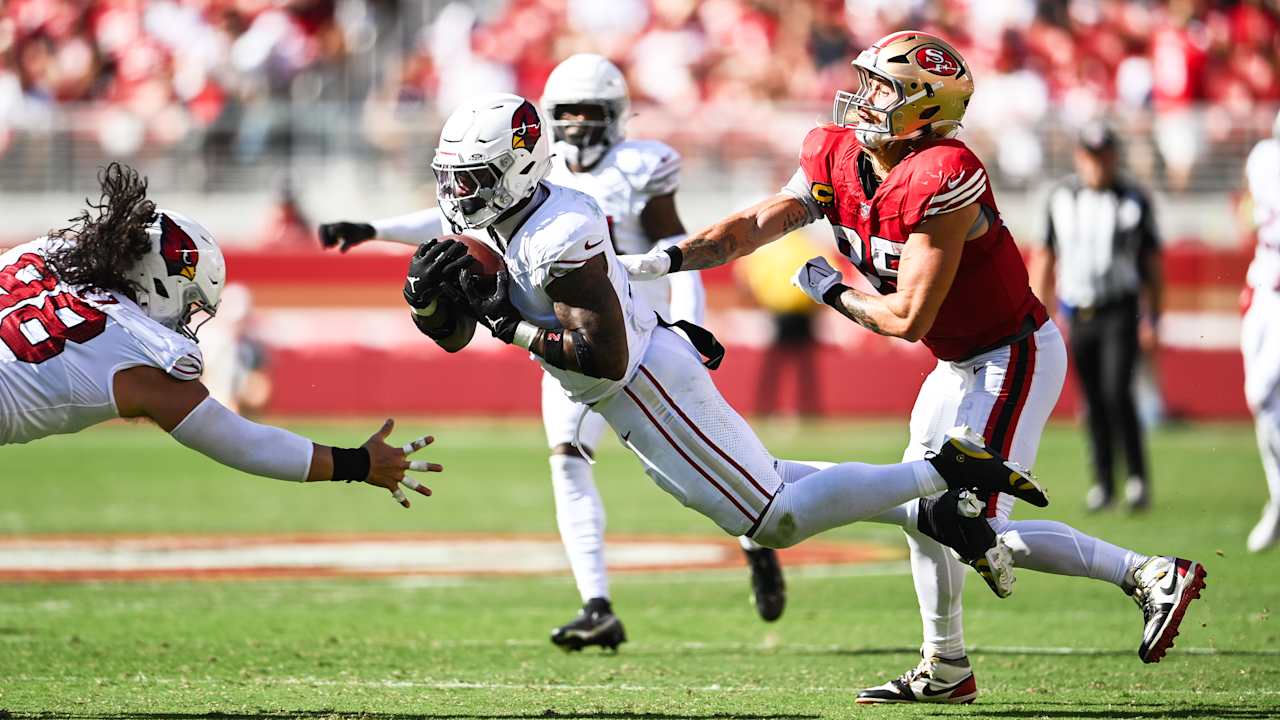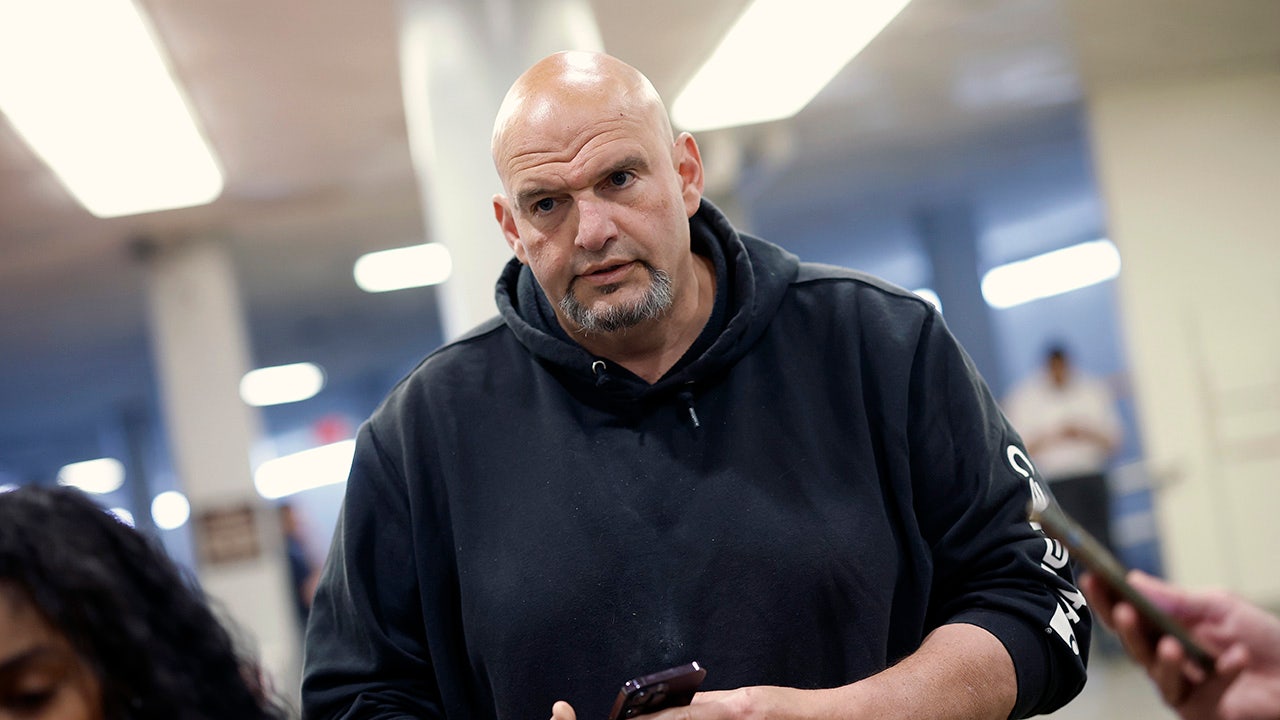Northeast
Meet the American who defined a new national identity, Noah Webster, New England patriot armed with the pen
Noah Webster fought for American independence with words, not swords.
His mighty pen defined the identity of a sprawling, proud and ambitious new United States.
The New England native’s impact on our national heritage proved far greater than just the American-English dictionary that still bears his name.
“Webster was very much in the truest sense of the word a patriotic American,” Peter Sokolowski, “dictionary ambassador” and editor at large for Merriam-Webster, based in Massachusetts, told Fox News Digital.
MEET THE AMERICAN WHO GAVE US NASHVILLE HOT CHICKEN, THORNTON PRINCE, MAN OF MANY PASSIONS
“He believed the new political America also needed a new cultural America, that there had to be cultural identity as distinct from Britain as our new political identity was distinct from Britain.”
Webster was an outspoken advocate of American independence.
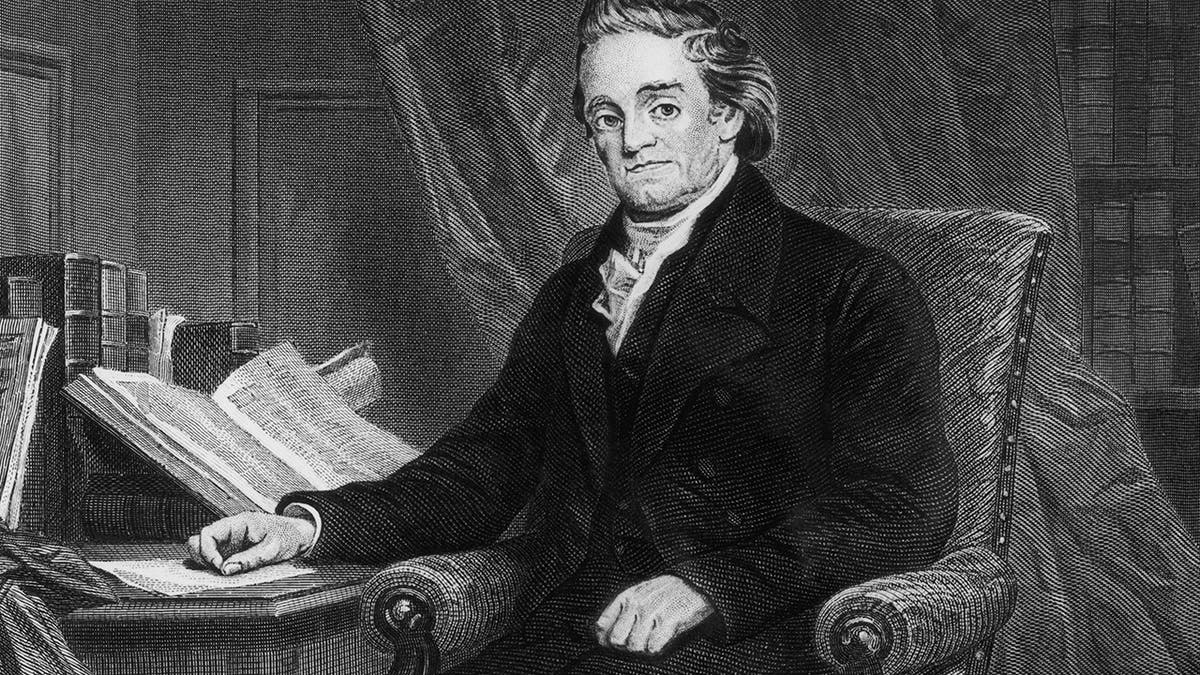
American philologist, lexicographer and journalist Noah Webster (1758-1843), circa 1800. (Archive Photos/Getty Images)
The lexicographer was pen pals with Founding Fathers John Adams, Ben Franklin, Alexander Hamilton and the new nation’s greatest swordsman, George Washington.
Webster has been dubbed “The Forgotten Founding Father,” most notably in the 2012 biography of that name by Joshua Kendall.
“Webster was very much in the truest sense of the word a patriotic American.”
He was also known as “The Schoolmaster of the Republic” — a testament to the remarkable success of his spelling book, ubiquitous in American schoolrooms throughout the 19th century.
Webster ensured that a nation, now 340 million strong and rooted in almost every language on the planet, has a common way to communicate.
American English has proven to be a powerful force uniting the world’s most dynamic and diverse immigrant nation.
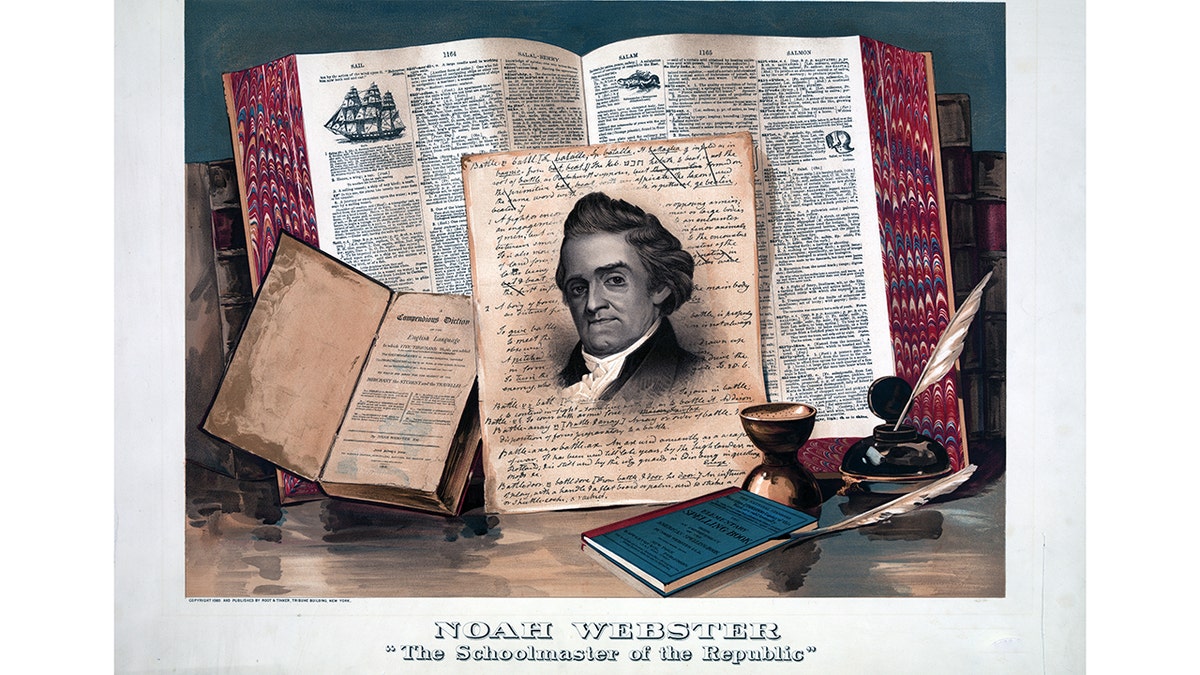
Noah Webster, the schoolmaster of the Republic, circa 1886. (HUM Images/Universal Images Group via Getty Images)
The word “immigrant” was actually one of the 12,000 new words first used by Americans — and first defined by Webster.
“Now is the time, and this [is] the country,” Webster wrote in 1789 in his “Dissertations on the English Language,” dubbed America’s linguistic Declaration of Independence.
“Let us then seize the present moment, and establish a national language, as well as a national government.”
Willing to fight, ‘but I must write’
Noah Webster Jr. was born on Oct. 16, 1758, in what’s now West Hartford, Connecticut.
Noah Webster Sr. was a farmer and descendant of John Webster, an Englishman who became one of the first settlers of Hartford in 1636.
Mother Mercy Steele was the great-great-granddaughter of Pilgrim leader William Bradford.
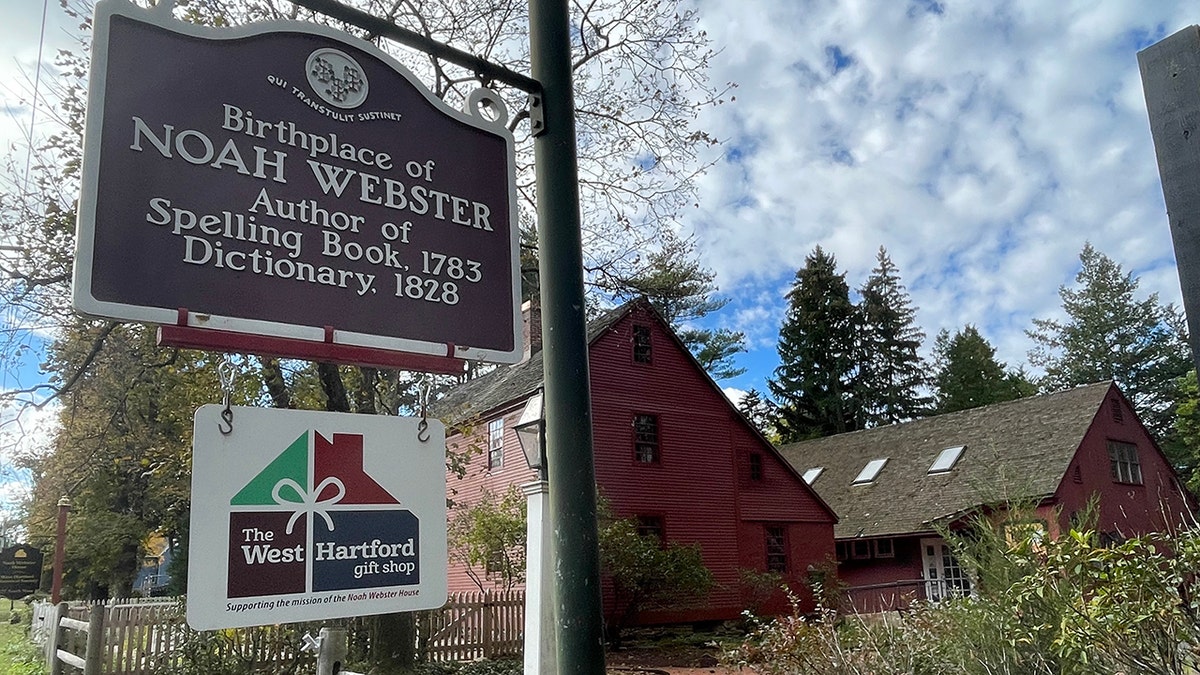
Noah Webster was born in West Hartford, Connecticut, in 1758. His schoolhouse spelling book sold an estimated 100 million copies, while he defined 70,000 words — thousands unique to the United States — in his 1828 “American Dictionary of the English Language.” (Kerry J. Byrne/Fox News Digital)
The younger Webster apparently had little appetite for farm life.
“I wish to enjoy life, but books and writing will ever be my principal pleasure,” Webster wrote years later in a letter to George Washington. “I must write; it is a happiness I cannot sacrifice.”
HOMESCHOOLED CHILDREN PAY TRIBUTE TO MEDAL OF HONOR RECIPIENT FR. EMIL KAPAUN AT ARLINGTON NATIONAL CEMETERY
Webster was a teenager when the American Revolution began. He spent much of the war years as a student at Yale in New Haven, Connecticut.
The bookish boy proved willing to sacrifice all for the cause of independence.
British forces marched south through New York in the summer of 1777, leaving a path of “terror and devastation,” according to period reports.
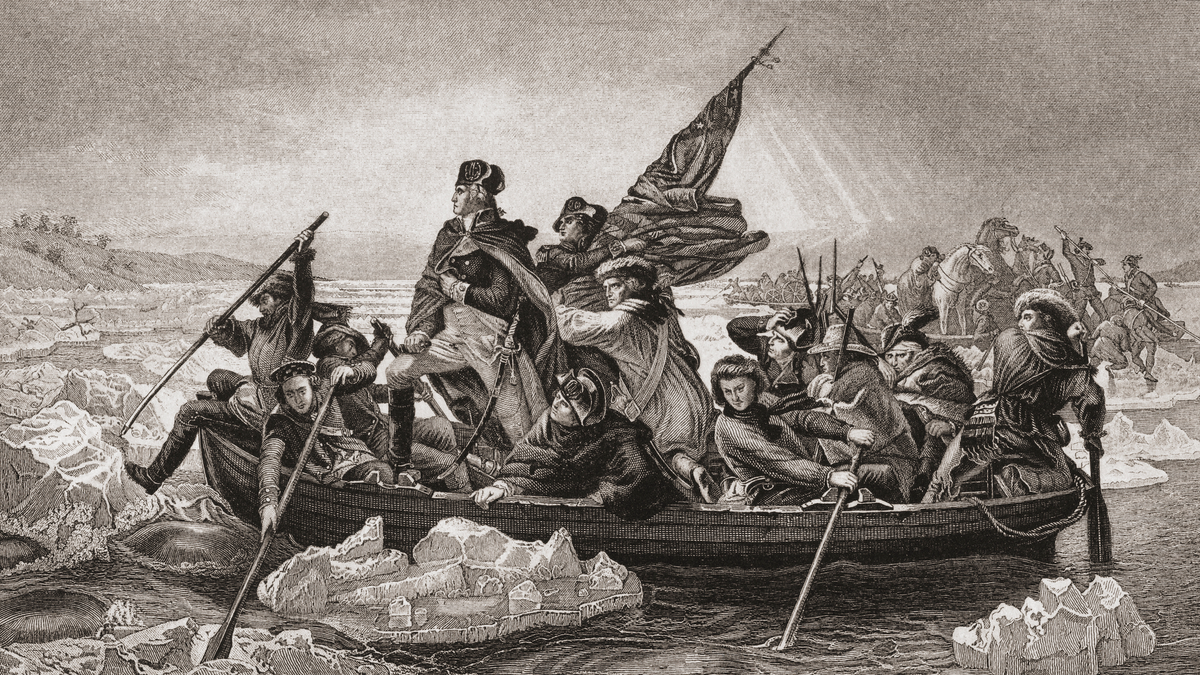
Washington crossing the Delaware, near Trenton, New Jersey, America, Christmas 1776. From English and Scottish History, published 1882. (Universal History Archive/Universal Images Group via Getty Images)
Webster Sr. was the captain of the local militia and gathered his men to meet the British forces. Webster Jr. joined the 60-mile march.
The British were defeated and turned back by colonial troops led by fellow Connecticut native, and, at the time still-American hero, Benedict Arnold, before the West Hartford group could join the fight.
“The little band of militia men from the West Division of Hartford … were most willing to fight and die for their country.”
“The little band of militia men from the West Division of Hartford returned home without firing a shot, but were most willing to fight and die for their country,” Jeffrey Mainville, executive director of the Noah Webster House, told Fox News Digital via email.
Webster’s prolific pen began shaping the new nation with his “Sketches of American Policy,” written in 1785.
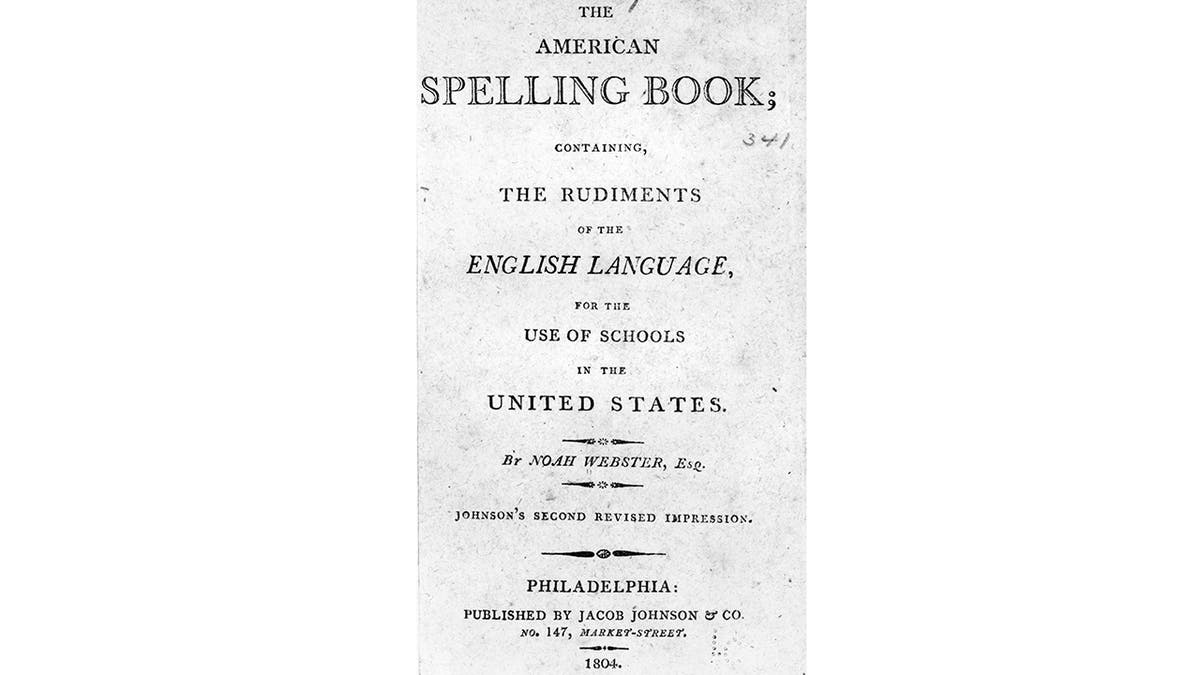
A book of American spelling containing the rudiments of the English language, for use in American schools, written by Noah Webster and published in Philadelphia in 1804. (MPI/Getty Images)
“Virtually every educated man in America who participated in the affairs of government read Webster’s Sketches,” Harlow Giles Unger wrote in his biography, “Noah Webster: The Life and Times of an American Patriot.”
Webster made his biggest impact on the new nation, however, in the schoolroom with his spectacularly successful textbook, commonly known as the “Blue-Backed Speller,” first published in 1783.
MEET THE AMERICAN WHO GAVE THE NATION OUR THANKSGIVING ORIGIN STORY: PILGRIM EDWARD WINSLOW
The schoolbook “taught children how to read, write, spell and pronounce words for over 100 years,” says the National Museum of Language in College Park, Maryland.
The “Blue-Backed Speller” was, by many reports, the bestselling book in America of the 19th century, after The Bible, with estimates of total sales as high as 100 million copies.
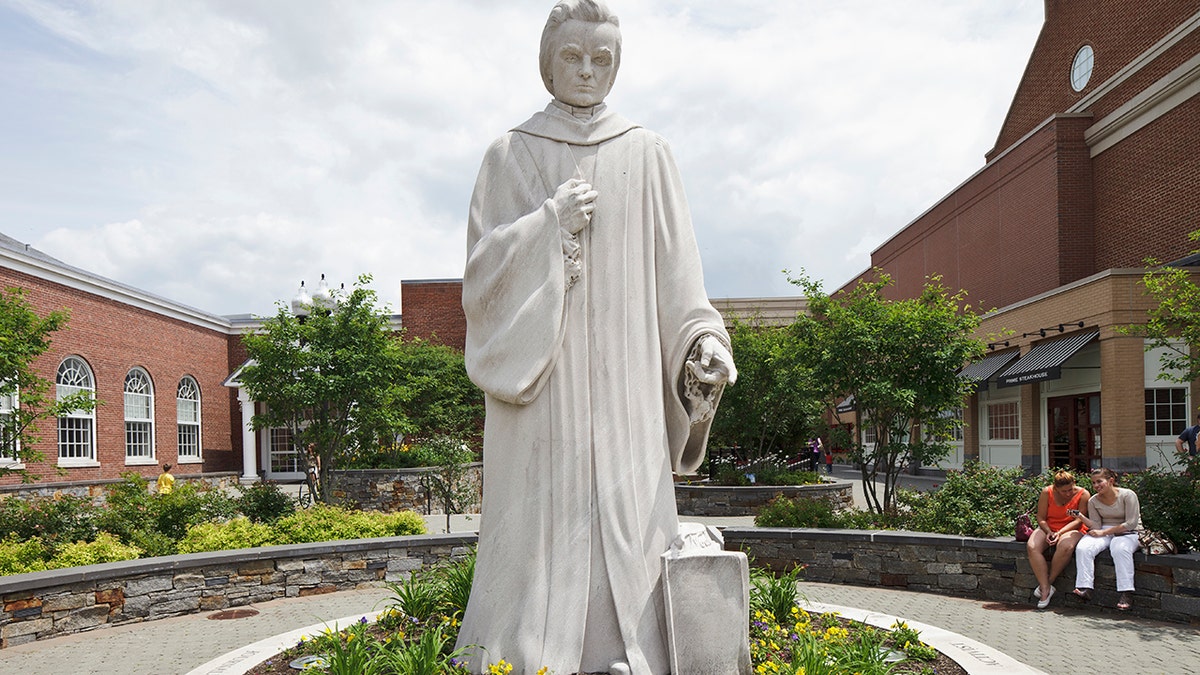
Statue of Noah Webster at Blue Back Square in West Hartford, Connecticut. The area is named for Webster’s influential schoolbook text, the “Blue-Backed Speller.” (James Leynse/Corbis via Getty Images)
The windfall from the textbook afforded Webster the opportunity to pursue his true passion: defining the language of the new nation.
The immigrant nation
Webster’s collection of words expanded with the breathless expansion of the new United States.
The “Blue-Backed Speller” was published in the same year that the British crown recognized American Independence with the Treaty of Paris in 1783.
Webster began exercising his power to define the national lexicon with his “Compendious Dictionary of the American Language.”
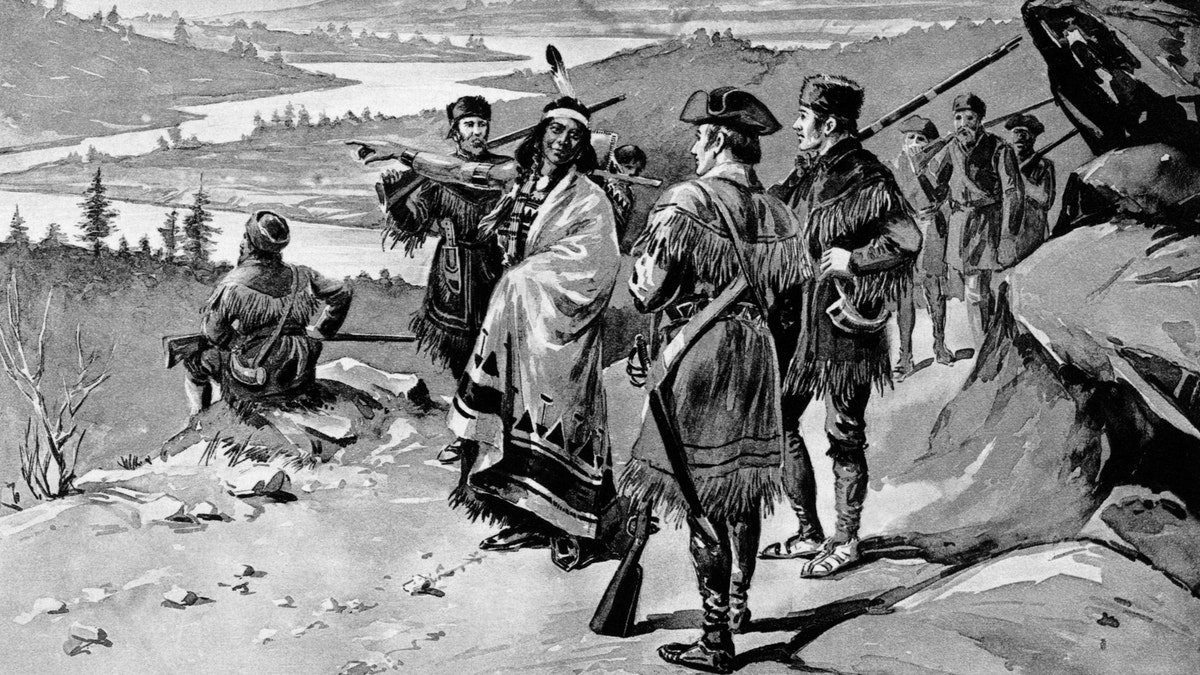
Sacagawea guiding the Lewis & Clark expedition. The epic journey from St. Louis to the Pacific Ocean and back ended in 1806, the same year that Noah Webster published his first dictionary. (Getty Images)
It expanded American English with 5,000 new words and was published in 1806 — the same year that Lewis & Clark returned from expanding the nation’s sense of identity all the way to the Pacific Coast.
Among new American words defined for the first time by Webster: “skunk,” “chowder” and, most profoundly, “immigrant.”
“He was on top of the word ‘immigrant’ almost from the get-go.”
“Immigrate” existed as a verb. But it was first used as a noun in spoken American English vernacular in 1789, according to “dictionary ambassador” Sokolowski.
Webster defined “immigrant” as “one who removes into a country.”
“He was on top of the word ‘immigrant’ almost from the get-go,” said Sokowlski, marveling at the speed at which Webster discovered, defined and published the new word with limited technology.
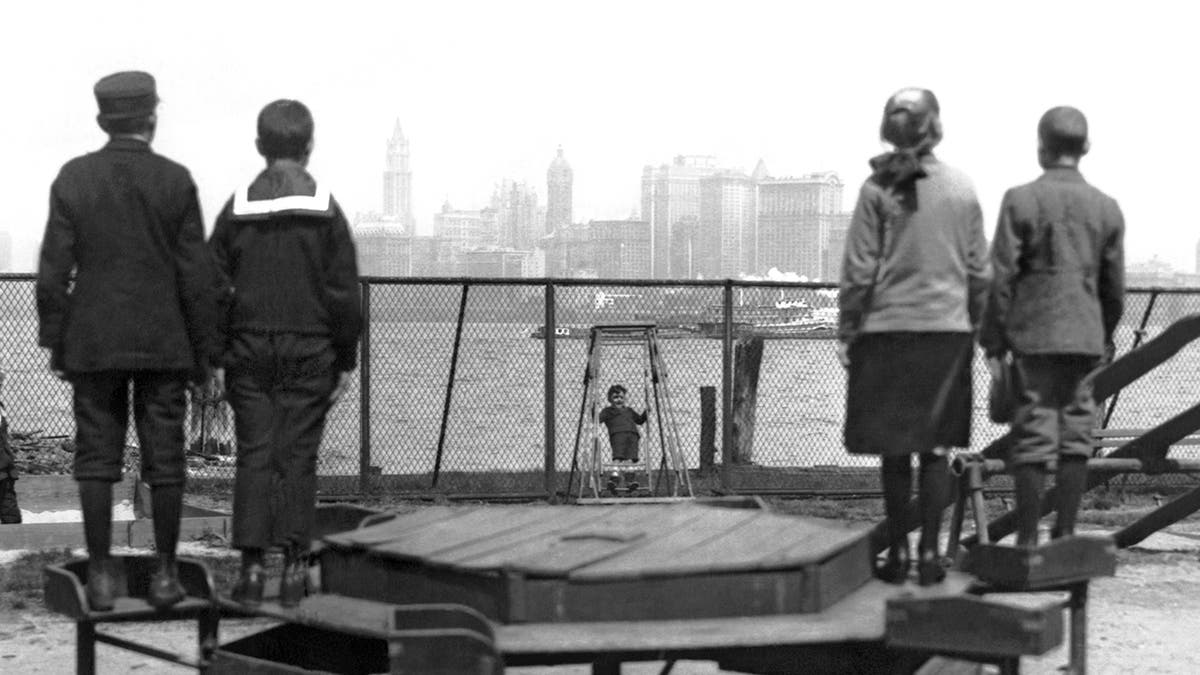
Immigrants representing four countries, Poland, Norway, Germany and Russia, look from Ellis Island toward the promised land, New York, New York, circa 1913. (Underwood Archives/Getty Images)
“He collected words the way all the lexicographers did,” said Sokolowski. “He used little slips of paper.”
With that rudimentary system, Webster published his staggering landmark “American Dictionary of the English Language” in 1828.
MEET THE AMERICAN WHO CREATED THE KENTUCKY DERBY, MERIWETHER LEWIS CLARK JR., BORN OF PIONEERS
It spelled and defined 70,000 words, 12,000 of which had never appeared in British English dictionaries — further distancing the new nation from its former colonial master.
Webster was singularly responsible for many of the differences between British English and American English spellings today: colour became color; analyse became analyze; and defence became defense, among other notable examples.
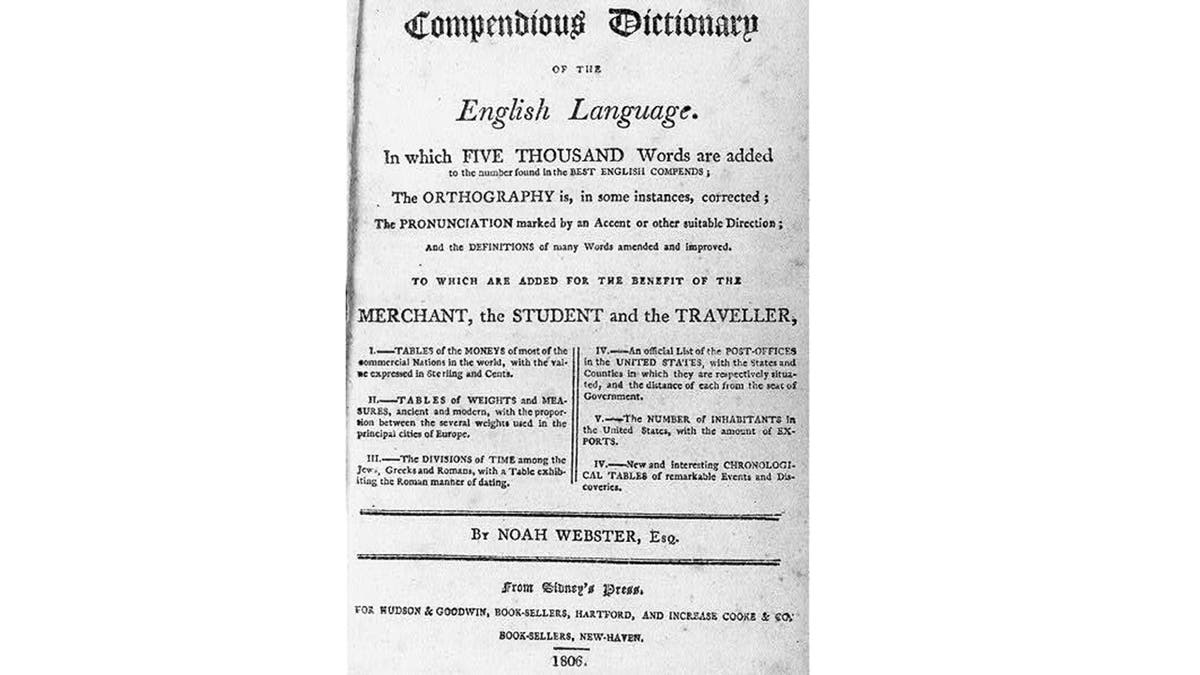
Noah Webster wrote his first dictionary in 1806, adding 5,000 words “to the number found in the best English compends,” he wrote. (Library of Congress)
Brits travelled — but Americans traveled.
Yet Americans don’t travel too far today to find proof of their distinct form of English.
Canada still uses traditional British spellings of words that America changed 200 or more years ago, despite the two nations sharing common pop culture, pro sports and a 5,525-mile border.
For more Lifestyle articles, visit www.foxnews.com/lifestyle
“We had a revolution, and they didn’t,” Joseph Janes, an associate professor at the University of Washington Information School in Seattle, told Fox News Digital.
He added, “Webster feels very deeply about America as a concept and as a country distinct from everywhere else.”

The word terrorism, in the news every day today, was first defined in American English by Noah Webster in 1841. Israel Defense Forces image shows a Hamas militant walking around a residential neighborhood at an undisclosed location in southern Israel on Oct. 7, 2023. (Israel Defense Forces via AP)
Webster added his last words to the dictionary in 1841, at 82 years old.
Among the newcomers that year: feminism and terrorism.
Feminism was essentially a synonym for feminine, notes Sokolowski — while terrorism referred specifically to the horrors of the French Revolution.
‘Superiority of her literary improvements’
Noah Webster died on May 28, 1843. He was 84 years old.
His legacy is best kept today at the Noah Webster House in West Hartford, a saltbox-style colonial where the educator was born and raised. It’s now a National Historic Landmark and open to the public.
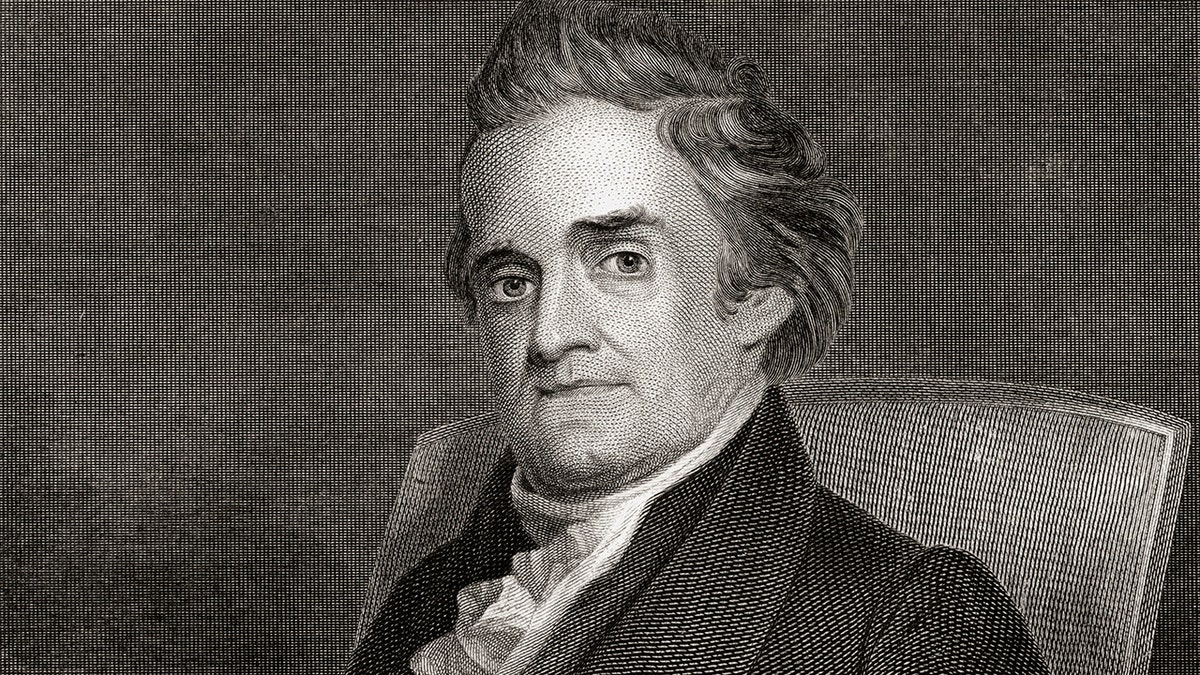
Noah Webster (1758-1843) was an American lexicographer, author and editor. From a 19th-century engraving by Kellogg after Morse. (Universal History Archive/Getty Images)
“He had no real ability to look this far and see what America would become,” Noah Webster House executive director Jeffrey Mainville told Fox News Digital.
“But the fact is that he took a path to document a truly American language and culture.”
MEET THE AMERICAN WHO MADE US FLIP FOR HAMBURGERS, LOUIS LASSEN, DANISH IMMIGRANT STREET-WAGON COOK
The Noah Webster House celebrates its patriotic son with an online game show each spring called “Webster’s War of the Words.”
The landmark works with the American Legion to distribute Webster’s dictionary to local schoolchildren today.
Blue Back Square in West Hartford is a popular retail and residential development in West Hartford, the name a nod to Webster’s influential spelling primer.
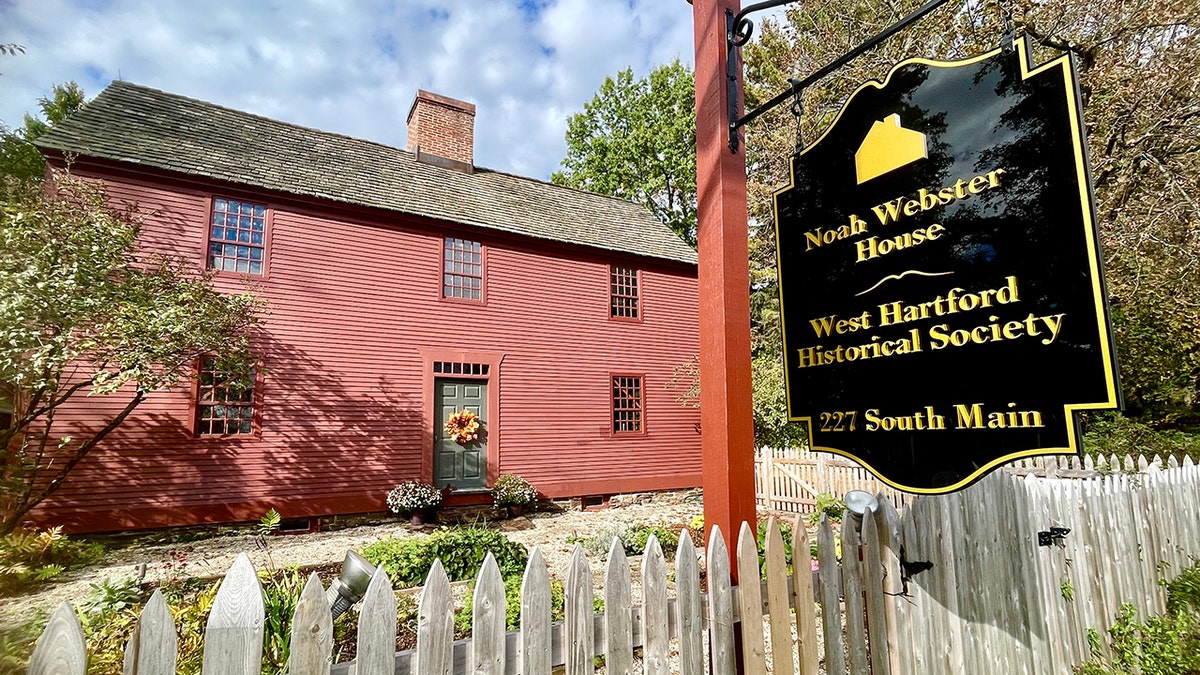
The Noah Webster House in West Hartford, Connecticut. “America’s Schoolmaster” and dictionary namesake was born here on Oct. 16, 1758. (Kerry J. Byrne/Fox News Digital)
Webster’s other achievements are almost too numerous to mention.
He was tapped by Alexander Hamilton to edit his Federalist newspaper in New York City in the 1790s and served in the Connecticut House of Representatives in the early 1800s.
Webster moved to Amherst, Massachusetts in 1815, helping to found Amherst College six years later.
He helped establish intellectual property law with the U.S. Copyright Act of 1831. The rights to his dictionary were purchased by brothers George and Charles Merriam after Webster’s death.
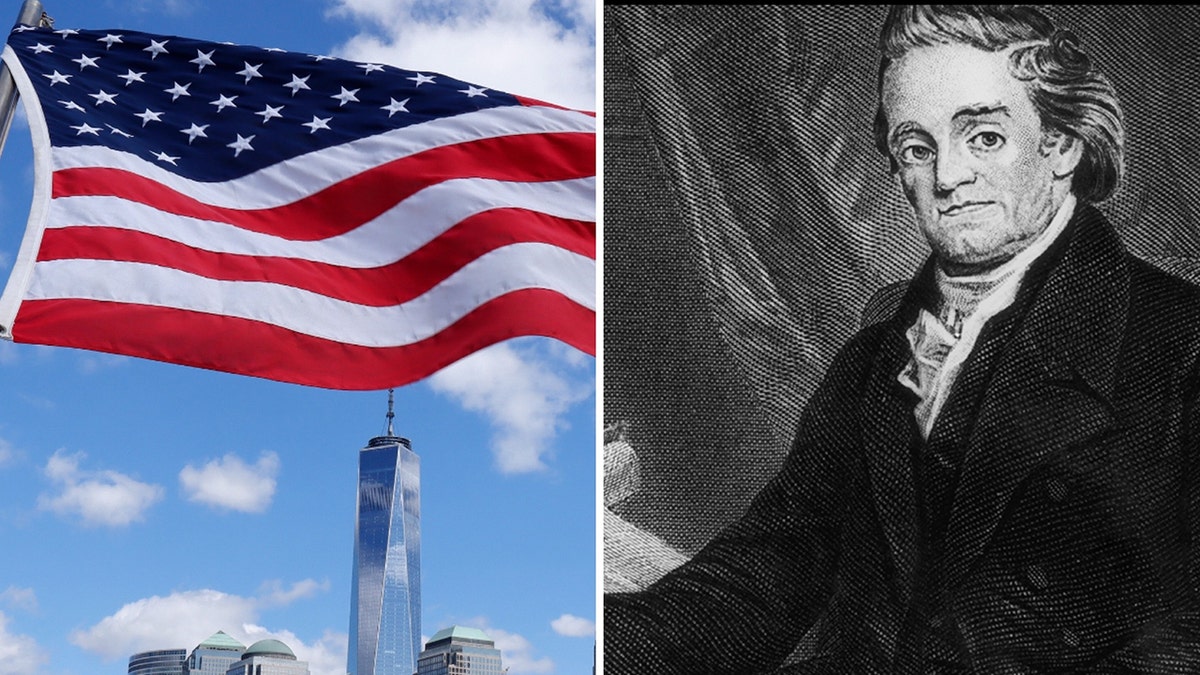
Noah Webster, right, helped shape the destiny of our powerful new nation with language. (Gary Hershorn/Getty Images; Archive Photos/Getty Images)
The Merriam-Webster Dictionary is published today in Springfield, Massachusetts, just 30 miles from where America’s patriot with a pen was born and where he began capturing the language of the ambitious new nation.
“Let us then seize the present moment, and establish a national language, as well as a national government.”
The Merriam-Webster archives house a remarkable treasure trove of collected knowledge, said Sokolowski. There are 16 million slips of paper with individual words, some of which date back to Webster’s original 18th-century curiosity and research.
To read more stories in this unique “Meet the American Who…” series from Fox News Digital, click here.
“This country must, in some future time,” Webster wrote in 1783, “be as distinguished by the superiority of her literary improvements as she is already by the liberality of her civil and ecclesiastical constitutions.”
Read the full article from Here

Boston, MA
Pro-Palestinian demonstration temporarily shuts down part of Boston’s Storrow Drive

By SAMANTHA CHANEY
BOSTON – Boston’s Storrow Drive was temporarily shut down Sunday afternoon as pro-Palestinian demonstrators rallied in the road, stopping traffic.
The protest comes just one day before Oct. 7, one year since the Hamas attack in Israel.
Protesters began their rally on Boston Common before moving to Charles Street and then on to Storrow Drive for half an hour. They ended their demonstration outside the Israeli Consulate in Boston, where hundreds called for an end to violence in the Middle East.
“We wanted to do something that people can really feel it and see it because this is about giving a vision of what happened to people in Gaza and now in Lebanon,” said one demonstrator. “When you are going aimlessly, changing places, trying to be safe.”
Police said the demonstration was peaceful and no arrests were made in connection with the rally.
Pittsburg, PA
'Sunday Night Football' live updates: Cowboys take on Steelers in Pittsburgh

Mike McCarthy’s Cowboys facing pressure to get over the hump
At 2-2, the Cowboys are off to their worst start since 2020, coach Mike McCarthy’s first season in charge and the only year in his tenure in which Dallas missed the playoffs (finished 6-10 in 2020).
After Dallas’ Week 2 loss vs. the Saints, owner Jerry Jones said McCarthy — who is in the final year of his contract — would be judged on postseason success.
“ I don’t think where (McCarthy ) is with his contract has anything to do with [the Week 1 win at] Cleveland … or how we played (in Week 2 loss vs NO ). We’re trying to get this team ready and in place to really make a run at the playoffs . … If we’ve got any albatross around our neck, it’s that we’ve been a good-to-very- good team during the season over the last four to five years with Mike, and we haven’t done well in the playoffs. So let’s trade some challenges during the season for doing well in the playoffs, if you want to look at it that way.”
Matchup of historic NFL teams
The Cowboys and Steelers are two of the NFL’s most storied teams, and this week, they’ll meet on SNF for the first time.
• Dallas and Pittsburgh have combined to win 11 Super Bowl titles (six for Pittsburgh, five for Dallas) and made 16 Super Bowl appearances (eight for both teams).
• The two teams have met in three Super Bowls, making Cowboys-Steelers the most common Super Bowl matchup in NFL history. They played each other in Super Bowl X in the 1975 season, XIII in the 1978 season and XXX in the 1995 season. Pittsburgh won the two Super Bowls in the 1970s, while Dallas took the 1990s matchup.
• The Cowboys and Steelers are the top two teams in wins in the Super Bowl era. The two teams are also first and second in regular season win percentage in the Super Bowl era (Dallas leads with .598, while Pittsburgh is 2nd at .590).
Since the Super Bowl XXX meeting nearly 29 years ago, DAL and PIT have met just six times, with each team winning three.
Connecticut
Police ask for help to find woman missing from New Haven

New Haven police are looking for the public’s help to find a missing woman who suffers from paranoid schizophrenia.
Denise Leary, 59, has been missing since Sept. 30.
She was last seen at her home in the area of Rock Creek Road, according to police.
Leary was wearing a black blazer jacket, black hat, dark blue jeans, black boots, and was carrying a multicolored tote bag.
Anyone with information is asked to call New Haven police at (203) 946-6316.
-
/cdn.vox-cdn.com/uploads/chorus_asset/file/25439572/VRG_TEC_Textless.jpg)
/cdn.vox-cdn.com/uploads/chorus_asset/file/25439572/VRG_TEC_Textless.jpg) Technology4 days ago
Technology4 days agoCharter will offer Peacock for free with some cable subscriptions next year
-

 World3 days ago
World3 days agoUkrainian stronghold Vuhledar falls to Russian offensive after two years of bombardment
-

 World4 days ago
World4 days agoWikiLeaks’ Julian Assange says he pleaded ‘guilty to journalism’ in order to be freed
-

 Technology3 days ago
Technology3 days agoBeware of fraudsters posing as government officials trying to steal your cash
-
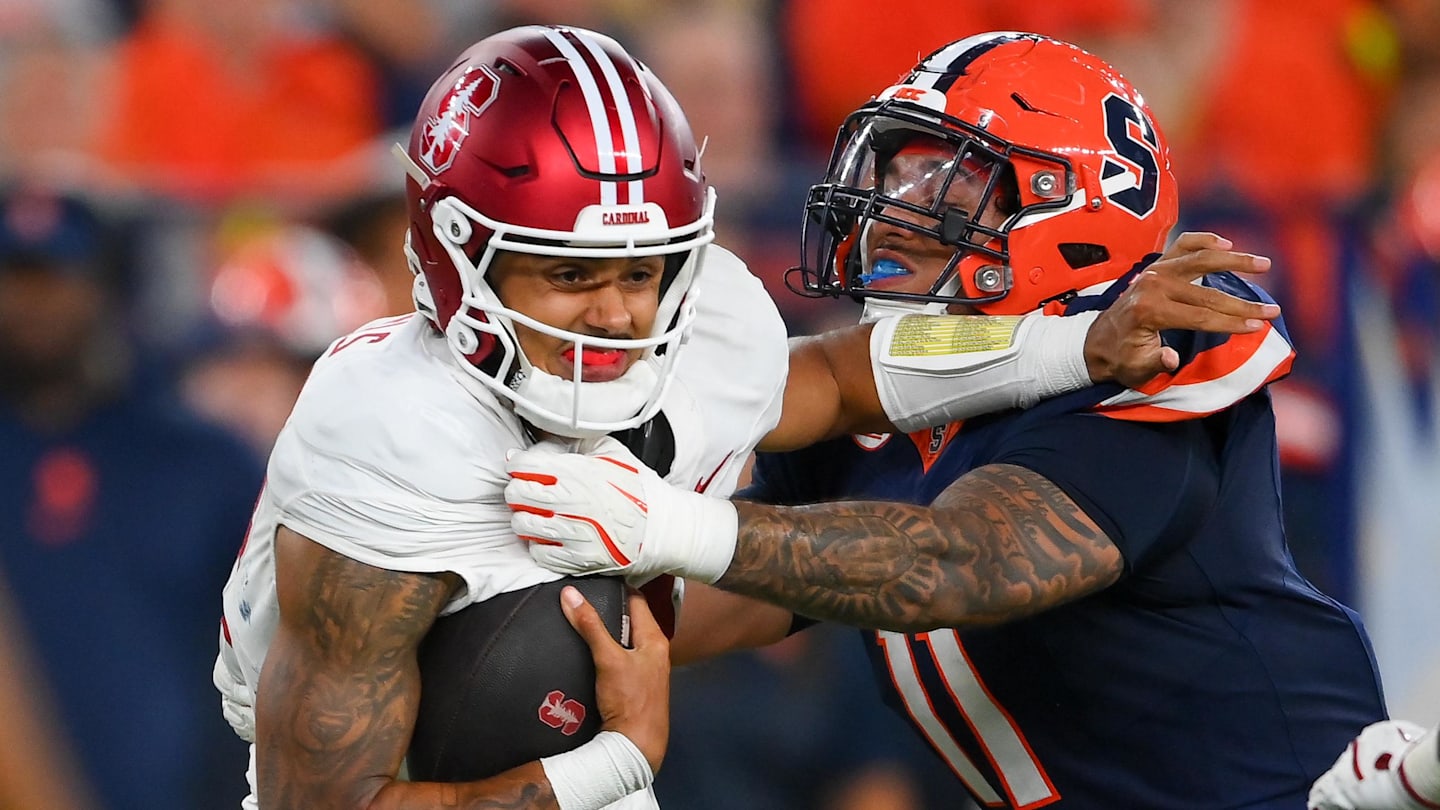
 Virginia5 days ago
Virginia5 days agoStatus for Daniels and Green still uncertain for this week against Virginia Tech; Reuben done for season
-
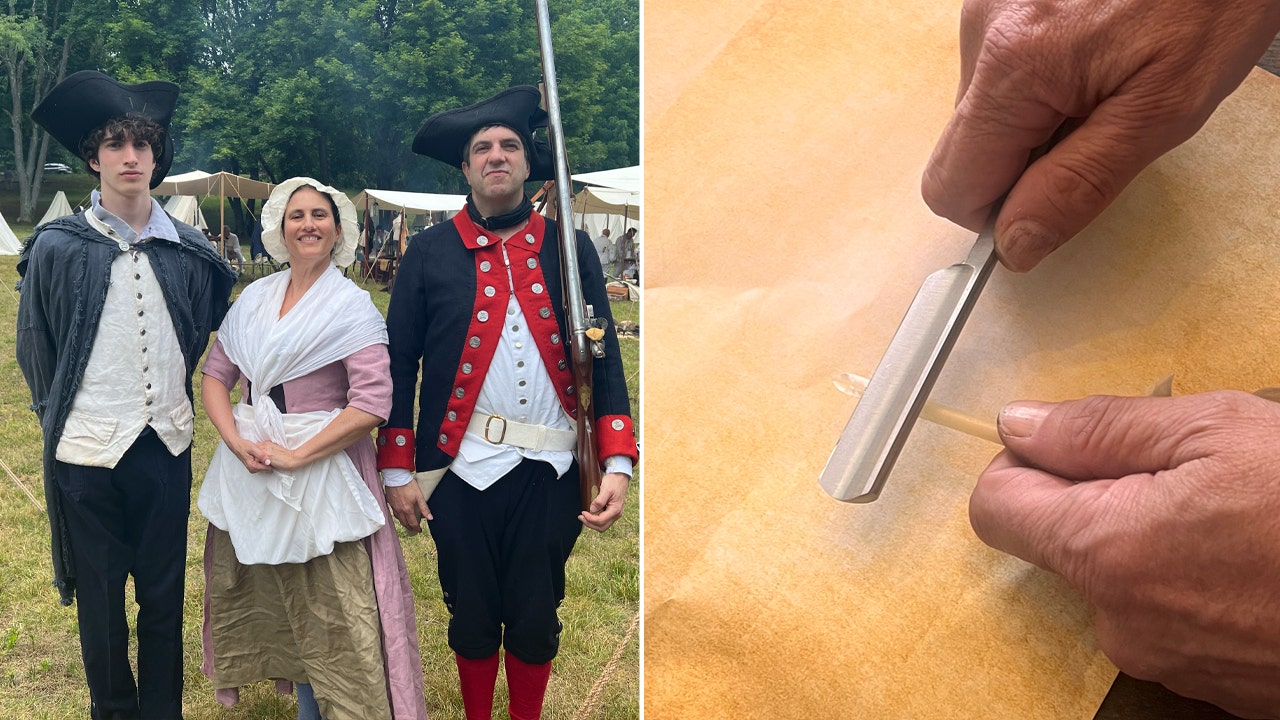
 Health1 day ago
Health1 day agoHealth, happiness and helping others are vital parts of free and responsible society, Founding Fathers taught
-

 Sports2 days ago
Sports2 days agoFreddie Freeman says his ankle sprain is worst injury he's ever tried to play through
-

 News1 day ago
News1 day agoLebanon says 50 medics killed in past three days as Israel extends its bombardment


